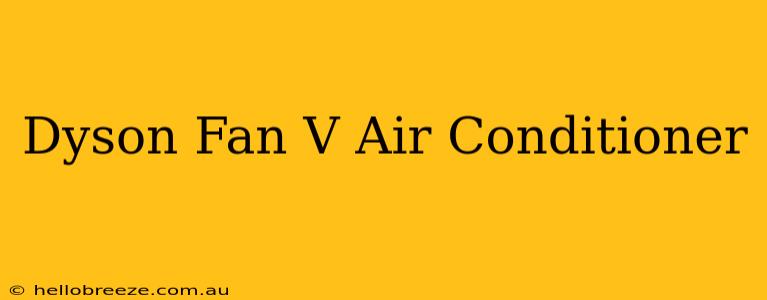Summer's heat can be brutal, leaving you searching for the best way to stay cool. Two popular choices often top the list: Dyson fans and air conditioners. But which one reigns supreme? This in-depth comparison will help you decide which is the better fit for your needs and budget.
Understanding the Differences: Dyson Fan vs. Air Conditioner
While both aim to cool you down, Dyson fans and air conditioners operate on fundamentally different principles. Understanding these differences is crucial for making an informed decision.
Dyson Fans: Air Circulation and Cooling
Dyson fans, renowned for their bladeless design and powerful airflow, excel at circulating air. They don't actually produce cool air, but instead move existing air around the room, creating a wind chill effect. This can be surprisingly effective on warmer days, especially when combined with a lower room temperature. Many models also include features like oscillation and night-time modes, offering customizable cooling experiences.
Key Features of Dyson Fans:
- Bladeless design: Safe for children and pets.
- Powerful airflow: Efficiently circulates air throughout the room.
- Quiet operation: Many models offer whisper-quiet performance.
- Oscillation: Distributes cool air evenly.
- Remote control: Convenient operation from afar.
Air Conditioners: Air Cooling and Dehumidification
Air conditioners work by removing heat and moisture from the air. They use a refrigerant to cool the air, which is then circulated through the room. This leads to a significantly lower room temperature, making them ideal for hot and humid climates. Beyond cooling, many air conditioners also offer dehumidification, which can improve indoor comfort significantly.
Key Features of Air Conditioners:
- Significant temperature reduction: Provides much cooler air than a fan.
- Dehumidification: Reduces humidity, improving comfort.
- Temperature control: Precisely set your desired temperature.
- Multiple modes: Often include features like fan-only mode, sleep mode, etc.
- Can be more energy-intensive: Higher running costs compared to fans.
Dyson Fan vs. Air Conditioner: A Head-to-Head Comparison
| Feature | Dyson Fan | Air Conditioner |
|---|---|---|
| Cooling Method | Air circulation, wind chill effect | Refrigerant cooling, dehumidification |
| Temperature Reduction | Moderate | Significant |
| Energy Consumption | Low | Higher |
| Noise Level | Generally quiet | Can be noisy, depending on the model |
| Cost | Typically more expensive than standard fans | More expensive than fans, varies widely |
| Space Requirements | Relatively compact | Can be bulky, requires adequate space |
| Humidity Control | None | Effectively reduces humidity |
Which One Should You Choose?
The best option depends on your specific needs and preferences:
-
Choose a Dyson Fan if: You live in a climate with moderate temperatures, you're looking for a stylish and quiet cooling solution, and energy efficiency is a priority. They are excellent for supplemental cooling.
-
Choose an Air Conditioner if: You live in a hot and humid climate, you require significant temperature reduction, and humidity control is essential for comfort.
Beyond the Basics: Considering Other Factors
Your decision should also consider:
- Budget: Dyson fans and high-quality air conditioners represent different investment levels.
- Room size: Air conditioners need to be appropriately sized for the room.
- Energy efficiency: Look for models with high Energy Star ratings.
- Installation: Air conditioners often require professional installation.
By carefully weighing these factors, you can choose the ideal cooling solution for a comfortable and refreshing summer.

